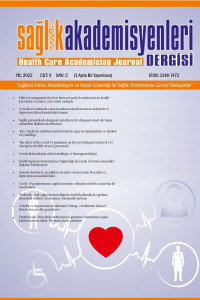Diyabeti Olan Bireylerde Motivasyonel Görüşme Yönteminin Yaşam Kalitesi Üzerine Etkisi: Bir Meta Analiz Çalışması
Öz
Amaç: Çalışmamızın amacı diyabeti olan bireylerde motivasyonel görüşme yönteminin yaşam kalitesi üzerine etkisini incelenmektir.
Gereç ve yöntem: Meta analiz niteliğindeki bu çalışma için, Ocak-Mayıs 2021’de PubMed, Web of Scıence, EBSCOhost ve Google Akademik, Yök tez veri tabanlarında yıl sınırlamasına gidilmeden tarama yapılmıştır. Çalışmada incelemeler yapıldıktan sonra 6 araştırma kalmış ve veriler meta-analiz yöntemi ile analiz edilmiştir.
Bulgular: Araştırmaların toplam örneklem hacmi 15425’dir. Bu meta analizde diyabeti olan bireylerde motivasyonel görüşme yönteminin yaşam kalitesini değiştirmediği saptanmıştır (SMD: -0,253, %95 CI: -0.720,0.653; Z= 1.065, p = 0.287, I2= %90). Çalışmada kullanılan ölçüm aracı, örneklem grubu, motivasyonel görüşmeyi uygulayan kişi, yaş aralığı moderatörü anlamlı olarak bulunmuştur (p<0.05).
Sonuç: Sonuç olarak çalışmada kullanılan ölçüm aracı, örneklem grubu, motivasyonel görüşmeyi uygulayan kişi ve yaş aralığının motivasyonel görüşme yönteminin yaşam kalitesi üzerindeki etki büyüklüğünü değiştirdiği belirlenmiştir. Diyabetli kişilerde motivasyonel görüşme yönteminin yaşam kalitesi etkisi üzerine etkisini belirlemek için daha geniş örneklemli randomize kontrollü çalışmalar yapılması önerilmektedir.
Anahtar Kelimeler
Kaynakça
- 1. International DiyabetesFederation (IDF) (2021),IDF Diabetes Atlas 10th Edition and other resources, https://diabetesatlas.org/atlas/tenth-edition/, Erişim tarihi:13.12.2021.
- 2. Yılmaz M. (2014), Tip 1 ve Tip 2 Diyabetli Bireylerde Yeme Tutum Durumlarının, Yaşam Kalitesi ve Metabolik Kontrol Üzerine Etkisi. Sağlık Bilimleri Enstitüsü, Kronik Hastalıklar Anabilim Dalı. Yüksek Lisans Tezi, İzmir: Ege Üniversitesi.
- 3. Pearce MJ, Pereira K, Davis E. Thepsychologicalim¬pact of diabetes: a practicalguideforthenurseprac¬titioner. JAANP 2013; 25:578-583.
- 4. Arslan E. (2011), Tip 2 DiabetesMellituslu Hastaların Tedaviye Uyumlarını Etkileyen Faktörler. Tıp Fakültesi, Halk Sağlığı Anabilim Dalı. Tıpta Uzmanlık Tezi, Diyarbakır: Dicle Üniversitesi.
- 5. Ögel, K. (2009). Motivasyonel Görüşme Tekniği. Türkiye Klinikleri J Psychiatry-Special Topics 2(2), 41-44
- 6. Rhode R. (2017). MotivationalInterviewing. IntegrativeMedicine, Fourth Edition, (David Rakel). Chapter 101. Part III. CopyrightbyElsevier, e-book.
- 7. Chen, S. M.,Creedy, D., Lin, H. S., Wollin, J. (2012). Effects of motivationalintervewingintervention on self- management, psychologicalandglycemicoutcomes in Type 2 Diabetes: A RandomizedControlled Trial. International Journal of NursingStudies, 49, 637–644.
- 8. Calhoun, D.,Brod R., Kirlin K., Howard B.V., Schuldberg D., Fiore C. (2010). Effectiveness of motivationalinterviewingforimproving self-careamongNorthern Plains Indianswithtype 2 diabetes. DiabetesSpectrum, 23(2), 107-114.
- 9. Song, D.,Xu, T.Z., Sun, Q.H. (2014). Effect of MotivationalInterviewing on Self-management in PatientswithType 2 DiabetesMellitus: A Meta-analysis. International Journal of NursingSciences, I,291-297.
- 10. Moher, D., Liberati, A., Tetzlaff, J., and Altman, D.G., (2009). PRISMA Group, 2009. Reprint—preferred Reporting Items for Systematic Reviews and Meta-Analyses: The PRISMA statement. PhysicalTherapy, 89, 873-880.
- 11. The Joanna Briggs Institute Critical Appraisal Tools Foruse in IBI Systematic Reviews. http://joannabriggs.org/research/critical-appraisal-tools.html(25.11.2021). 12. Tufanaru, C., Munn, Z., Aromataris, E., Campbell, J., and Hopp, L. (2017). Chapter 3: Systematic Reviews of Effectiveness. In: Aromataris E, Munn Z (Editors). Joanna Briggs Institute Reviewer's Manual. The Joanna Briggs Institute.
- 13. Egger, M., Smith, G. D., Schneider, M., Minder, C. (1997). Bias in meta-analysis detected by a simple, graphical test. British Medical Journal, 315(7109), 629.
- 14. Grissom, R. J., & Kim, J. J. (2005). Effect sizes for research: A broad practical approach. Lawrence Erlbaum Associates Publishers.
- 15. Cohen, J. (1988). Statistical power analysis for the behavioral sciences (2nd ed.). New Jersey: Lawrence Erlbaum Associates, Inc. Retrieved from http://books.google.com.tr/
- 16. Calhoun, D., Brod, R., Kirlin, K., Howard, B. V., Schuldberg, D., & Fiore, C. (2010). Effectiveness of motivational interviewing for improving self-care among Northern Plains Indians with type 2 diabetes. Diabetes Spectrum, 23(2), 107-114.
- 17. Chen, S. M., Creedy, D., Lin, H. S., & Wollin, J. (2012). Effects of motivational interviewing intervention on self-management, psychological and glycemic outcomes in type 2 diabetes: a randomized controlled trial. International journal of nursing studies, 49(6), 637-644.
- 18. Rubak, S., Sandbæk, A., Lauritzen, T., & Christensen, B. (2005). Motivational interviewing: a systematic review and meta-analysis. British journal of general practice, 55(513), 305-312.
- 19. Long, L., Mordi, I. R., Bridges, C., Sagar, V. A., Davies, E. J., Coats, A. J., ... & Taylor, R. S. (2019). Exercise‐based cardiac rehabilitation for adults with heart failure. Cochrane Database of Systematic Reviews. Issue 1. Art. No.: CD003331. DOI: 10.1002/14651858.CD003331.pub5.
Ayrıntılar
| Birincil Dil | Türkçe |
|---|---|
| Konular | Sağlık Kurumları Yönetimi |
| Bölüm | Derleme |
| Yazarlar | |
| Yayımlanma Tarihi | 1 Haziran 2022 |
| Kabul Tarihi | 12 Mart 2022 |
| Yayımlandığı Sayı | Yıl 2022 Cilt: 9 Sayı: 2 |


